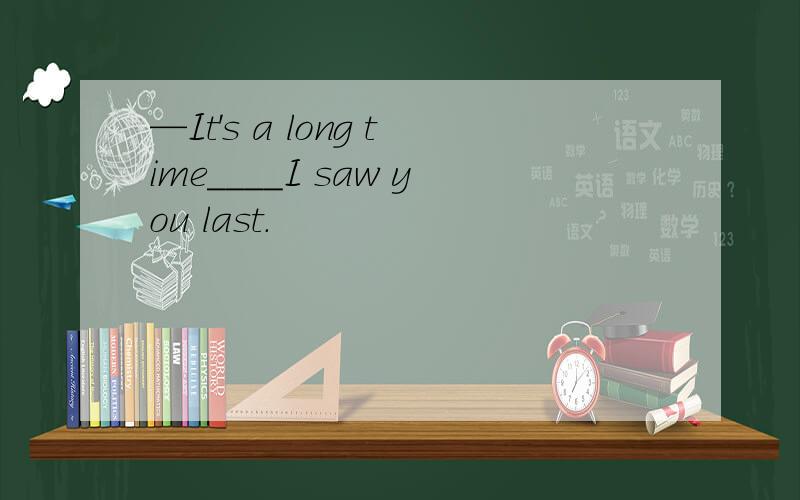—It's a long time____I saw you last.
来源:学生作业帮 编辑:大师作文网作业帮 分类:英语作业 时间:2024/11/10 16:36:56
—It's a long time____I saw you last.
—yes,and what a pity since it will be a long time____we see each other again.
since,before B.before;since C.until;after .D.after,until
正解:A
我知道A是对的,但是为什么不选D?我怎么感觉D也是对的呢?
—yes,and what a pity since it will be a long time____we see each other again.
since,before B.before;since C.until;after .D.after,until
正解:A
我知道A是对的,但是为什么不选D?我怎么感觉D也是对的呢?

这是需要理解记忆的【固定句型结构搭配】:
①It + 【is /has been】+ time + 【since 自从...起】+ sb /sth【did 】
【主句】常用【现在完成时】或【一般现在时】,【从句】用【一般过去时】;
②It + 【was /will be】+ time + 【before 多久之后】+ sb /sth【did/do 】
【主句】用【一般将来时】,【从句】用【一般现在时】;【主句】用【一般过去时】,【从句】用【过去时】;
③It + 【was】+ 具体钟点+ 【when当...时】+ sb /sth【did 】 时间状语从句
④It + 【was】+ 【介词】+具体钟点+ 【that】+ sb /sth【did 】 强调结构
⑤ sb 【did 】sth 【after sth did】
sb 【did sth】【 after doing sth/after sometime】
这是after 经常的句型搭配
提醒:我们学习英语,不可只跟据汉语意思,揣测它的用法,或认为可以这样那样用;而应该尽量接受、理解英语本来正确的用法和结构,因为它是外来语言,有其自身的规律和规范,更有其独特的语言背景和文化积淀、风俗习惯等.
①It + 【is /has been】+ time + 【since 自从...起】+ sb /sth【did 】
【主句】常用【现在完成时】或【一般现在时】,【从句】用【一般过去时】;
②It + 【was /will be】+ time + 【before 多久之后】+ sb /sth【did/do 】
【主句】用【一般将来时】,【从句】用【一般现在时】;【主句】用【一般过去时】,【从句】用【过去时】;
③It + 【was】+ 具体钟点+ 【when当...时】+ sb /sth【did 】 时间状语从句
④It + 【was】+ 【介词】+具体钟点+ 【that】+ sb /sth【did 】 强调结构
⑤ sb 【did 】sth 【after sth did】
sb 【did sth】【 after doing sth/after sometime】
这是after 经常的句型搭配
提醒:我们学习英语,不可只跟据汉语意思,揣测它的用法,或认为可以这样那样用;而应该尽量接受、理解英语本来正确的用法和结构,因为它是外来语言,有其自身的规律和规范,更有其独特的语言背景和文化积淀、风俗习惯等.
—It's a long time____I saw you last.
it's a long time since i last saw you
It's a long time since i saw you last.
----It's a long time ( ) I saw you last.
---It’s a long time ______ I last saw you.
It's a long time ____I last saw you.Yes,and it will be anoth
It's a long time that saw you (we met) last time,you looks w
----It's a long time ( ) I saw you last.----Yes,and what a p
it's a long time since i last saw you这句话有错误么
It's a long time since i saw you last 这句中的it是不是形式主语?
It's been a long time since I last saw a film.还是It's a long
How long( )you last saw her?A.was it when B.is it after C.is